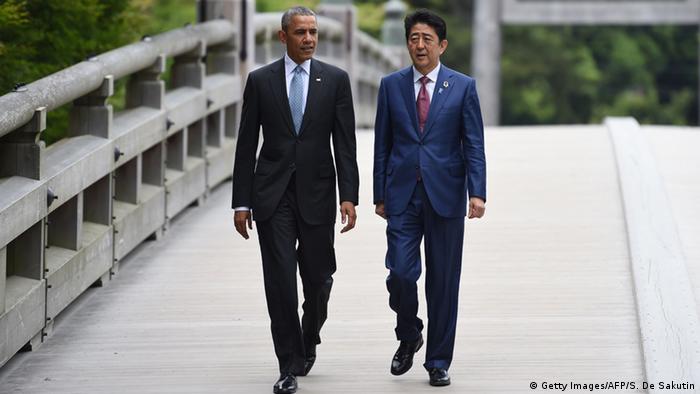DW – May 26, 2016 – Global economic woes and China’s maritime claims have set the tone as the G7 summit opens in Japan. Overshadowing the annual event is a planned visit Friday to Hiroshima by US President Barack Obama.
Japan welcomed leaders of the G7 to its Pacific peninsula resort of Ise-Shima on Thursday by highlighting Japanese exports of “quality infrastructure” and expertise as its answer to global troubles.
Absent as potential extra guests at the annual gathering of the Group of Seven advanced economies were Japan’s neighbors and rivals, Russia and China.
China – the world’s flagging but second-biggest economy – has disputes with numerous Asian nations over islands in the South China Sea. Russia, whose eastern seaboard neighbors Japan, remains at odds with Western G7 members since it annexed Crimea from Ukraine in 2014.
Scene-setter at Shinto site
Japanese Prime Minister Shinzo Abe opened the summit by taking fellow leaders, including German Chancellor Angela Merkel, to the peninsula’s Ise Shrine, the forested heartland of Japan’s Shinto religion, 300 kilometers (200 miles) southwest of Tokyo.
“It is the place to present the beauty of nature and the richness of our culture and long tradition,” said Japanese foreign ministry spokesman Yasuhisa Kawamura.
He added that Abe was keen to promote infrastructure exports such as gas and coal-fired power plants and bullet trains.
“We’re very happy to share our experiences and expertise,” said Kawamura.
Differences of fiscal policy and reforms had dominated a preceding G7 finance ministers’ meeting last week.
Alarm over migratory trends
Also attending the Ise-Shima summit, the European Council’s Polish president, Donald Tusk, urged G7 nations to help take a lead in managing the migrant crisis facing European nations.
Last year, some 1.3 million refugees, mostly from conflict-ridden Syria and Iraq, asked for asylum in the European Union – more than a third of them in Germany.
On Tuesday, the Berlin-based Institute for Population and Development published a study saying that Middle East and northern African nations were failing to generate enough industrial jobs for expanding, demographically-young populations.
“Unless society succeeds in offering these persons a perspective to find a job then the refugee numbers from the region will rise long-term,” said Reiner Klingholz, the instutite’s director, adding that only 40 percent of this group was employed.
Infrastructure boost sought
Japan will ask the G7 summit to expand infrastructure support by $200 billion (179 billion euros), including loans for development projects, including the building of roads, power plants and other infrastructure around the world.
Japan itself plans to spend about $6 billion on education, training and job creation for 20,000 people in the Middle East and improved schooling for girls in Africa and South Asia.
Later Thursday, G7 leaders were to get a brief crash course on Japan’s world-leading green car technology.
European Commission head Jean-Claude Juncker added that the possible exit from the European Union by Britain, hinging on its referendum in late June, was also hanging over the summit.
China dubious
Chinese media reacted to the summit by suggesting that its agenda would be irrelevant if it failed to discuss the South China Sea.
“The G7, in order not to become obsolete and even negatively affect global peace and stability, should mind its business rather than pointing fingers at others and fueling conflicts,” said the China news agency Xinhua.
Also attending the summit are Italy’s prime minister, Matteo Renzi, French President Francois Hollande, British Prime Minister David Cameron and Canada’s new prime minister, Justin Trudeau.
After the summit, Obama will on Friday visit Hiroshima, becoming the first sitting US leader to travel to the site of the world’s first nuclear attack, on August 6, 1945.

